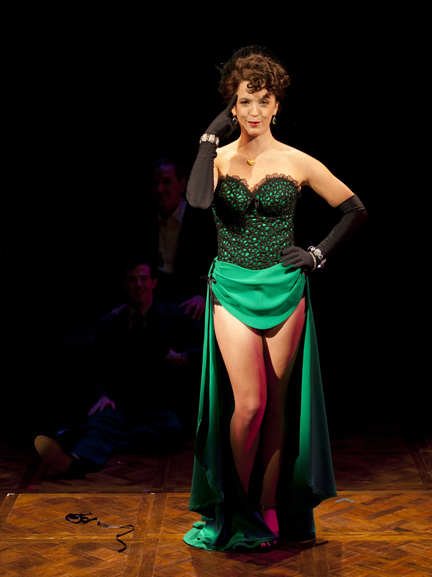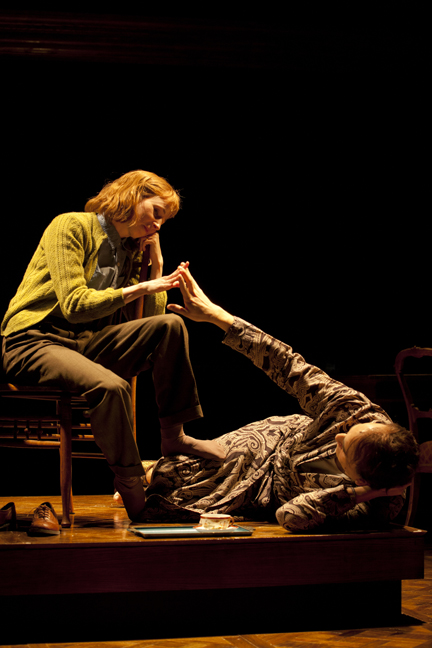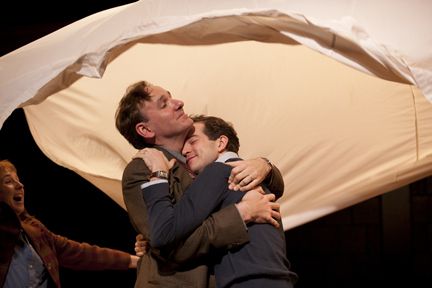“The house in Brooklyn is a symbol for me…it’s a risk, it’s a gamble with myself and others.” Thus George Davis, onetime novelist, fiction editor late of Harper’s, when, in 1940, he undertook to set up what today would be called “an artist’s colony” in a somewhat dilapidated Victorian house in Brooklyn Heights. The place became known as “February House” due to the February birthdates of the house’s two most famous residents—W(ynstan). H(ughes). Auden (Erik Lochtefeld) and Carson McCullers (Kristen Sieh)—and is the inspiration, as symbol, for a different sort of gamble: February House, a musical, Music and Lyrics by Gabriel Kahane, Book by Seth Bockley, that dramatizes the creative aspirations, romantic trysts, and interpersonal squabbles of a group of writers and intellectuals.
In addition to Auden and McCullers, and Davis himself (Julian Fleisher), there is Chester Kallman (A. J. Shively), a young poet and Auden’s object of desire; Benjamin Britten (Stanley Bahorek), the composer; his partner Peter Pears (Ben Barnett), a tenor; Erika Mann (Stephanie Hayes), German writer, performer, and daughter of novelist Thomas Mann; and the famous “ecdysiast” (or striptease artiste) Gypsy Rose Lee (Kacie Sheik). Together they make for a gathering of rather genteel bohemians—four Americans, and four expatriates fleeing the Nazis over-running Europe and battering at England.
These are heady times certainly, and interesting people unquestionably, but is this the stuff of musical theater? Certainly not of the big, rousing, brassy Broadway variety, but it’s ideal for a more leisurely and lyrical kind of entertainment, one that depends—hence the gamble—on its ability to make people known primarily for what they write engaging as persons apt to burst into song to express their states—whether primarily internal, as in Auden’s lovely love song to Chester, “Awkward Angel,” or more physical, as in Benjy’s and Peter’s frantic fit about “Bed Bugs.” There are moments when any character’s fussiness can become a bit cloying—each, in true artist fashion, tends to be the center of his or her own world—and we might begin to feel there’s not enough drama to give us a sense of dread, of something at stake.
The big questions are: whether McCullers’ husband Reeves (Ken Clark) will get her back, or if she’ll run off with Erika; whether the operetta about Paul Bunyan, on which Benjy and Wynstan labor, will be a success; whether or not Chester will be true to the latter, his romantic suitor; and, of course, whether this ramshackle affair of free spirits setting sail in a house in Brooklyn will remain shipshape. The darker dread, which bursts in most dramatically at a New Year’s dinner in Part Two, where Reeves is also present, poking away at the friends’ complacency, as Erika does from time to time, is what the Huns are doing to civilization over there in Europe. February House, without benefit of newsreels or other showy intrusions (only one brief radio announcement enters from the outside world) manages to convey a sense of the period and the perilous times in which these young people (most of them not yet thirty) try to go where their talents lead them. But since we know how the war turns out, that element isn’t enough to keep us on edge.
So, while there’s not a lot of drama, there is delight aplenty in February House, most of it provided by the songs, which have the knack of seeming to arise spontaneously from the characters’ interactions. Backed, on-stage, by a pianist (Andy Boroson) and accompanist (Andy Stack) on guitar and banjo, the arrangements have simple, direct presentations that avoid the kind of bombast we tend to associate with “show tunes.” Even brassy Gyspsy Rose Lee (the least developed character, no pun intended) is relatively sedate in her big show-stopping and clothes-shedding number, “A Little Brain” (when strippers reference Melville and Woolf, we’re decidedly above lowbrow).
February House is a show worth seeing a second time, once you know the story, to simply concentrate on the songs—the one that stayed with me most was “Goodnight to the Boardinghouse,” the haunting tune with which George closes Act One, reprised for the conclusion by George and Carson. More insinuating than strident, the song captures the very hopeful, personal, emotional pride and joy that one invests in a project, as well as the somewhat sad but not utterly chastened feeling one has at its conclusion. It’s a strong but subtle emotion to end on: no one has died, no one is ruined, no one is fabulously happy or successful at the show’s end. All, but George, have simply moved on, and we stay with him, poignantly, as the person here who will be most forgotten by history, his “February House,” as Carson says to him, his magnum opus.
With that in mind, applaud the casting of Julian Fleisher as George—he has the bonhomie, the knowing looks, the den-mother coddling, the grade-school teacher cheer, the man-of-the-world theatricality, the self-deprecating humor of a man with a great idea and the personality to pull it off. He’s so vividly rendered you believe he might walk off the stage and, if you’re lucky, invite you to a Forties soiree—and you would go with him most anywhere. Fleisher’s singing voice is less than overpowering, but his songs in the show are the kind that make you lean forward and listen. He’s a major strength of this production. You would be glad of the chance to spend time with him even if his housemates weren’t famous writers.
Then there’s the literary stars: As Auden, Erik Lochtefeld is a more blustery Brit than I expected the chain-smoking poet to be, and his primary colors are bemusement and, when Chester’s around, infatuation, but he also carries well the dignity of the enterprise—we have the sense that anything Auden attaches himself to can’t be an utter waste of time (not even an operetta on Paul Bunyan). As McCullers, Kristen Sieh is peppy, more Southern Gosh than Gothic, but for that very reason it’s hard not to like her, particularly as her enthusiasm helps turn Auden from snide into graciously supercilious.
Much of the comedy comes from Britten and Pears as a kind of Gilbert and George by way of Gilbert and Sullivan—Barnett particularly earns plaudits for playing Pears as the kind of wry British “ponce” that can’t help but be entertaining, and Bahorek gives us Britten as a dapper milquetoast who might yet come out of himself and achieve something. They get most of the musichall comedy songs.
Then the love interests: Shivelly’s Kallman is a pretty boy who wants to be taken seriously (his fun number is “Chester’s Etiquette”; sung to Britten and Pears, it more or less updates Wilde’s advice on how to succeed in society for Forties Manhattan); Stephanie Hayes’ Erika is teutonically dour in her mannish suits, only to surprise us with the ardour of her passion for Carson—her goodbye look is heartbreaking; Ken Clark’s Reeves is a bit of a cipher—we aren’t sure whether Carson is right to leave him or should go back, but his criticisms of the House aren’t simply boorish and that’s to his credit. Finally, Kacie Sheik’s Gypsy Rose Lee enters late in Act One, and persists in Act Two primarily for comic tension, but I felt she needed to queen it up quite a bit more to keep pace with these boys.
Which leads to a comment about the play’s sexual politics: when Wynstan, on bended knee, proposes marriage to Chester, and when Benjy and Peter, who have been posing as brothers on Long Island, hold hands and think of the benefits of living here (“Let everyone know the truth of it”), we should further applaud February House’s debut at Long Wharf in a state that has recognized same-sex marriage since 2008, and civil unions for same-sex couples since 2005. One wishes the show a successful cross-country tour.
February House A World Premiere Musical A Co-Production with The Public Theater Book by Seth Bockley, Music and Lyrics by Gabriel Kahane Directed by Davis McCallum Choreographed by Danny Mefford Musical Direction by Andy Boroson Orchestrations by Gabriel Kahane
Long Wharf Theatre, Stage II February 15-March 18, 2012
Photos: T. Charles Erickson, by permission of Long Wharf Theatre




